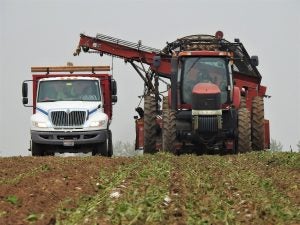When president-elect Joe Biden takes the oath of office on Jan. 20, he will usher in a new administration with decidedly different objectives than those of his predecessor. The newly appointed secretary of agriculture, EPA administrator, and other Cabinet members will carry out the direction of the Biden Administration with profound impacts on agriculture. As the transition of power takes place, farmers and ranchers need to adapt to one of the biggest topics bound to affect agriculture in this new administration: sustainability.
“Sustainability” is a buzzword frequently thrown around policy circles in Washington, D.C., and often heard in advertising. But what does it truly mean?
Sustainability can be defined as production methods that increase efficiency and environmental benefits. Another part of the definition includes the economic benefits brought to a community. The jobs that farming and ranching generate are often the lifeblood of the rural communities in which they operate and must be part of the definition of sustainability.
In politics, much of the discussion centers around efforts to reduce greenhouse gas emissions and mitigate the effects of climate change. The issue is becoming more bipartisan as voters become engaged, making it relevant for members of Congress and prompting the introduction of legislation.
Top priorities for some in the House and Senate Agriculture Committees are issues related to pesticide use, carbon sequestration in the soil, carbon dioxide emissions, and genetically engineered seeds. You can bet environmental issues will continue to be a major topic the next four years and in the drafting of the 2023 farm bill.

Consumers are also increasingly interested in where their food comes from, how it is produced, and its environmental impact. A quality product is no longer enough to win a consumer’s favor as people increasingly seek brands that align with their personal values.
According to a 2019 Hotwire survey, 47 percent of shoppers want to do business with companies they perceive as environmentally conscious. Some consumers are willing to pay a premium price for food they believe is produced in an environmentally superior way. Corporate America has taken notice with many companies making sustainability pledges and advertising products that are sustainable or environmentally friendly.
» Related: 5 deceptive food-marketing ‘healthy halo’ buzzwords
While sustainability has moved into the spotlight, consumers are increasingly migrating to urban areas and away from where food is produced and the people that grow it. Farmers and ranchers make up only 1.3 percent of the American workforce, compared with 70 percent in 1840.
Consumers can no longer talk to farmers or ranchers about what they do, because they don’t know any. They formulate ideas about food production by what they read on the Internet or view in a documentary. People are genuinely curious about where their food comes from, and they’re looking for answers. As each generation becomes further removed from the land, it’s no wonder that people question how their food is produced and are unaware of the major advances made in the industry.
You as farmers and ranchers are already in a great position to engage in these conversations, because sustainability is ingrained in everything you do. Odds are your family has been in farming or ranching for generations. You make decisions with the hope of passing the land on to the next generation. You’re constantly thinking about how to improve efficiency, save water, reduce inputs, and improve the land.
You may never have used the word “sustainable” to describe your operation, but it’s vital to start talking about how you’ve positively impacted the environment and generated jobs to align with current consumer demand and policy discussions. Leading those conversations from your farms and ranches is the best method to demonstrate your sustainable practices.
In the sugarbeet industry, we’ve been working hard to tell a number of success stories. The debut of the Roundup Ready sugarbeet in 2008 led to huge gains in sustainable farming practices. Better production practices have become available to growers that have helped improve the environment. In fact, our industry has identified over 25 environmental benefits achieved since the adoption of bioengineered seeds. Some of these include:
- The use of fewer and less toxic herbicides
- Fewer herbicide applications and fewer trips across the field
- Less herbicide runoff into groundwater
- Reduction of labor
- No-till and strip-till conservation methods to reduce soil erosion from wind and water
- Increased air quality due to less fuel use
These are just a few of the sustainability achievements the sugarbeet industry has made since 2008, and we’ve been busy sharing them with decision-makers in Congress. Whether it’s dairy, wheat, potatoes or cattle, every commodity has a success story to tell.
You’re already equipped to tell those stories because farmers and ranchers are the ultimate environmentalists, even if you’ve never thought of yourself that way. Your very livelihoods depend upon careful stewardship of existing resources, giving you instant credibility to speak on these topics.
It’s time to start crafting your own sustainability story. Begin thinking about how your operation positively contributes to the environment and how to tell that story. Whether it’s through association boards, grower-led companies, or even your own social media channels, there are plenty of ways to spread the word about how agriculture sustains both our environment and our communities.
There is now a premium on sustainable production practices thanks to consumers, elected officials, and food companies. Agriculture has a unique story to tell and as we head into four years of a new administration, it’s more crucial than ever that we share it.
Brad Griff grew up on a farm in Southern Idaho and spent 10 years working for members of Congress, specializing in agriculture and natural resources policy. He now serves as the Executive Director of the Idaho Sugarbeet Growers Association and is passionate about promoting agriculture.



